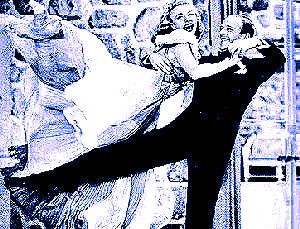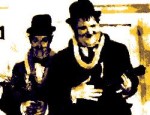Film Review
More screwball comedy than musical, Fred Astaire and Ginger Rogers'
penultimate film together lacks the sparkle of their previous on-screen
encounters but is buoyed up by some effective comedy (mostly involving
blunt digs at the then burgeoning fashion for Freudian analysis) and a
cute collection of toe-tapping Irving Berlin numbers.
Carefree may not be in the same
league as previous Fred and Ginger offerings but it's an entertaining
romp and is the only one of their films in which the legendary dance
partners get to share a proper on-screen kiss.
The film's best number,
I Used To Be
Color Blind, a stylish song-and-dance routine shot at four times
normal speed so that it would play back as a slow-motion dream
sequence, was originally intended to be shot in colour, although the
idea was abandoned on cost grounds. The film's second big number,
The Yam, is sung as a solo by
Rogers, reputedly because Astaire found the lyrics ridiculous; happily,
the duo come together for the set-piece dance after the song - a
technically impressive piece of choreography, even if it lacks the
ambition and panache of other Fred and Ginger finales.
Despite its exemplary cast (Ralph Bellamy is at his most
entertaining as Fred's hopeless rival) and well above average
production values,
Carefree
has not attained the classic status of the great Fred and Ginger
musicals. As a madcap rom-com, however, it has much going for it,
and is a superlative vehicle for Ginger Rogers' under-used comedic talents.
The best bit is when Ginger goes beserk with a shotgun and makes her
bid to wipe out most of the cast, including her dancing partner,
something she seems to enjoy a little too much. After their next
film,
The Story of Vernon and Irene Castle
(1939), Fred and Ginger would go on to pursue solo careers, ending one
of Hollywood's great screen partnerships - something to make you weep.
© James Travers 2011
The above content is owned by frenchfilms.org and must not be copied.
Film Synopsis
In a desperate attempt to get his fiancée Amanda to agree to
marry him, Stephen Arden asks his psychiatrist friend, Dr Tony Flagg,
to analyse her. Tony does as he is instructed, but unwittingly
causes Amanda to fall in love with him. To rectify the situation,
Tony subjects Amanda to a subconscious mind stimulus which is intended
to persuade her that he has no feelings for her. The treatment
does not go quite as intended - Amanda leaves Tony's consulting room in
a semi-hypnotic state and starts causing mayhem wherever she
goes. By the time he realises what he has done, Tony discovers
that he really does love Amanda and resolves to win her back, even if
it means ending a long-cherished friendship...
© James Travers
The above content is owned by frenchfilms.org and must not be copied.



